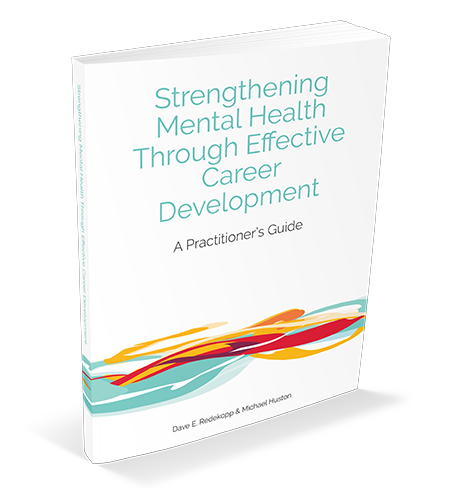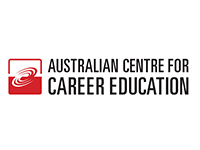| Author(s) | Dave E. Redekopp and Michael Huston |
| Publisher | CERIC |
| ISBN | 978-1-988066-45-5 |
Synopsis
This book makes the case that career development practice is a mental health intervention and provides skills and strategies to support career development practitioners in their work. It explores how practitioners do far more than help people prepare for, enter and navigate career pathways – they change people’s lives in ways that improve mental health and overall well-being. The authors also emphasize their focus is mental health, not mental illness, and address this distinction in the book.
The guide shows how to connect career development services to clients’ mental health while working ethically and within the boundaries of competence and role. It includes a focus on evaluating the mental health impact of career services and communicating these outcomes to stakeholders.
Practitioners will be equipped to:
- improve their career development services,
- broaden their view of client concerns to include well-being outcomes as part of a whole-person approach to career/life planning,
- and strengthen their collaboration with healthcare service providers.
Written primarily for career development practitioners, namely those who help clients or students, this resource is also of use to the supervisors and managers of career practitioners. Researchers and academics will find a robust and testable model of career development and mental health relationships.
Get Your Copy
- Download the free epdf
- Print now available $28.95 via Amazon or Chapters.Indigo or ebook $19.99 (Kindle or Kobo)
- Purchase bulk copies (10 or more) at 30% off by contacting sales@ceric.ca

About the Authors
Based in Edmonton, Alberta, author Dave Redekopp is the national award-winning President of Life-Role Development Group Ltd. He has devoted more than 30 years to the development of better career development and workplace concepts and practices.
Co-author Michael Huston is a long-standing associate at Life-Role Development Group as well as a career development practitioner, and Associate Professor and Counsellor at Mount Royal University in Calgary, Alberta.
Reviews
It is so refreshing to find a readable and well-researched book that integrates theory, research and practice and focuses on the relationship between career development and mental health. Changing economic conditions point towards a future where career goals must include mental health concerns as well as finding suitable work. This broader perspective has been neglected and represents a new vision for our field. The authors, Dave Redekopp and Michael Huston, have created an excellent resource, a book that needs to be on everyone’s shelf.
This guide is a rare and wonderful combination of thoroughly researched, evidence-based information on the inevitable interplay between career development and mental health, with down-to-earth questions, opportunities for reflection, and pragmatic implications for practitioners in the field. Following their own advice, the authors speak both to the head and to the heart of their readers, at once affirming, informing and challenging us to embrace the wider repercussions and deeper effects that our work in career development has on those we serve. I, for one, gained a greater appreciation for the privilege and the potential of the work we do! What Dave and Michael have created in these pages is an incredible boon to the profession, and I believe it should become required reading for new and seasoned practitioners in the field.
For too long, artificial boundaries have been created between work and mental health in counseling practice, theory, and research. The reality of life is much more complex and nuanced. Dave Redekopp and Michael Huston have written a masterful book that maps the space shared by work and mental health, resulting in a game-changing contribution. This book provides a compelling conceptual framework for integrating mental health and career interventions as well as very accessible strategies and tools. This book will quickly become a classic in the field!
The book provides a significant contribution to our understanding of the key role career development aims and interventions can play in promoting mental health well-being and in working with individuals who are experiencing mental health challenges. It also encourages career practitioners to consider the scope and limits of their role, and the skills they need to be effective in working with mental health issues.
This is a book about human wholeness and interconnectedness. “The hip bone is connected to the thigh bone”, work and career are connected to personal and mental well-being. Everything human interrelated. The authors don’t let you forget this. Career development is life development.
Redekopp & Huston have written a timely and relevant discussion of the links between career development and mental health. The text is highly readable, extremely well organised, and grounds theoretical discussion in practical applications, case studies, and direct reflection questions aimed at career guidance professionals. Setting out to write a book that is simultaneously a theoretical analysis and a practical guide might seem fraught with danger but the authors have achieved this end admirably – the work is not only thought-provoking and academically rigorous, but also presents a well-structured, useful and encouraging professional tool. I would highly recommend Redekopp & Huston’s work not only to careers guidance counsellors and mental health professionals but also to government policy makers, directors of any organisation that has careers guidance or mental health support as part of its purview, as well as to a general interested audience. It is an excellent and inspiring piece of work.
This is one of the most promising and encouraging works to come into our field in a very long time. This work demystifies mental health and shows how every practitioner can be a powerful change agent through career development practices. Early in the book, Redekopp and Huston make the assertion that, “As a practitioner who does career development intervention – whether through counselling, teaching, advising, managing or any other relevant function – you will influence mental health.” Given the rising tide of mental health concerns in all walks of life, this is a much-needed and most timely assertion. After reading this book, every practitioner will be able to say “I can do this;” because of this book, they will also be highly motivated to do so.
Redekopp & Huston have taken the link between career development practices and mental health and opened it up to a whole new level. They remind us that we as career practitioners, in whatever form of intervention we take, will influence mental health whether we are aware or not. Their book takes this fact and teases it out for us. It looks at definitions, research, established links, conceptual models, frameworks, principles, skills, practices and evidence. It is a timely reminder to us to be more aware and to act with more intentionality. We can not claim to address mental illness but we can claim to have a major impact on strengthening the mental health of our clients. In this ever-changing world, what a magnificent claim to be able to make. This book gives us all the material we need to strengthen our own practice in this significant area of need.
The authors combine their extensive experience in career development and mental health counselling to make a compelling case for career development as a mental health intervention. They provide a solid evidence base for the links between intentional career development and better mental health and provide tips for career development practitioners and counsellors to extend that evidence base, join together in a community of practice, and activate their spheres of influence to advocate for career development interventions as a route to improved mental health.
There is a growing recognition of the profound links between work, mental health and well-being. The career development profession has been slow to wake up to the importance of this connection. In this book, Redekopp and Huston have clearly outlined the issues, and explained the implications for career development practitioners in a very accessible way. This is a welcome and long-overdue guide to navigating a challenging dimension of practice.
There is a plethora of research evidence that demonstrates the positive impacts that work has on our overall psychological health and wellness – and as a specialist in Psychological Health & Safety (PH&S) in the workplace, I appreciate the focus Dave Redekopp & Michael Huston take in underscoring unique considerations for career development practitioners when it pertains to better understanding the intersection between meaningful work and overall mental heath and wellness.
The ability to work and love are the life roles most deeply connected to one’s happiness and satisfaction with life. As Redekopp and Huston explain in this important book, career development interventions address simultaneously the capacity to enact successful careers and satisfying relationships. The authors show how career development practices are indeed mental health interventions and encourage practitioners to both appreciate the mental health aspects of their career services and become more intentional using career interventions that promote the mental health of their students and clients.
Publishing of the Guide was made possible in part by the generous contributions of Knowledge Champions.





